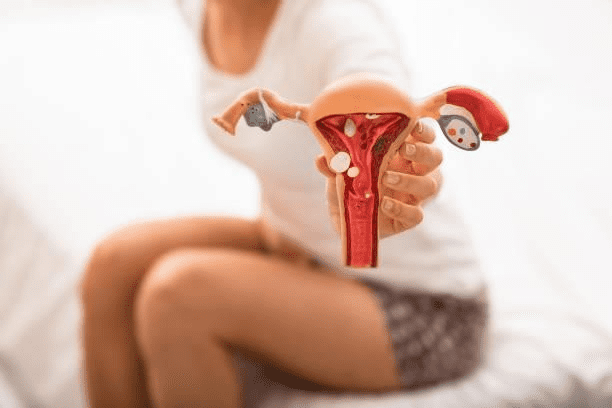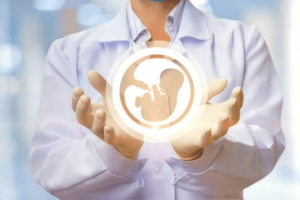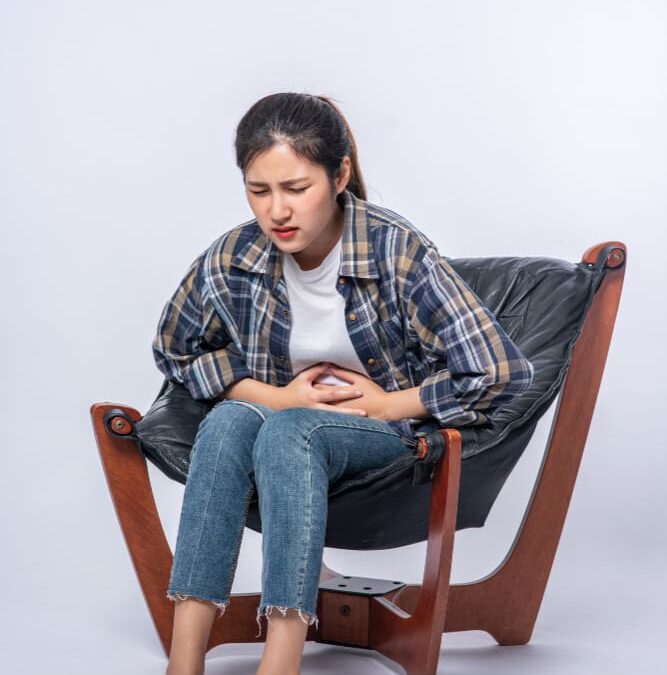Endometriosis impacts approximately 190 million women and girls of reproductive age worldwide. For some women, it can cause pelvic pain, heavy menstrual bleeding, and fertility problems.
“Endometriosis is a major cause of infertility among women,” says one of the best fertility specialist in India Dr. Nisarg Patel. “It occurs when tissue similar to the uterus lining grows outside the womb. Endometriosis can be challenging to detect despite its prevalence, leading to delayed treatment.”

Stages 1 & 2 involve minimal to mild lesions near or around the pelvis area. Stage 3 endometriosis assesses how bad it is in the pelvis. It’s worse than the early stages, with deeper endometrial-like tissue growth affecting many pelvic organs. Also, it often leads to scar tissue called adhesions, causing pain and more problems.
Do you have questions about Stage 3 endometriosis life expectancy? Please consult Dr. Patel, an IVF (in vitro fertilization) expert and director of the Nisha IVF Centre. Nisha IVF Centre is a state-of-the-art IVF facility, often called the best IVF Centre in Ahmedabad.
Take the first step towards a smoother transition and improved quality of life.
Causes Of Stage 3 Endometriosis
Stage 3 can impact life with severe pelvic pain, period discomfort, and fertility issues.
The exact causes of endometriosis, including Stage 3 endometriosis, are not fully understood. However, it is believed to be influenced by multiple factors. Here are three potential contributing factors:
- Retrograde Menstruation: Some menstrual blood holding endometrial cells flows back through the fallopian or uterine tubes. It enters the pelvic cavity rather than exiting the body. These cells can then implant and grow on pelvic organs, leading to endometriosis.
- Hormonal Factors: Hormonal imbalances, notably higher estrogen levels, may contribute to the development and progression of endometriosis. Estrogen can promote the growth of endometrial tissue on the outside of the uterus.

- Genetics: There appears to be a genetic component to endometriosis, as it often runs in families. If a close female relative (such as a mother or sister) has endometriosis, you may also have a higher risk of developing it.
Do you suspect you have endometriosis or a specific genetic condition? Please visit IVF expert Dr. Nisarg Patel for expert diagnosis and treatment options.
Now, let’s understand the common symptoms of stage 3 endometriosis. This will help us understand the signs to look out for.
Signs And Symptoms Of Stage 3 Endometriosis
Recognizing symptoms can help alert us of an underlying condition and prompt us to visit a health professional. The common symptoms of stage 3 endometriosis include:
- Pelvic Pain: Women with Stage 3 endometriosis often experience severe, persistent pain in the pelvic area.

- Heavy Menstrual Bleeding: Periods can be excessively heavy, causing discomfort and anemia.
- Painful Intercourse: Sexual activity may become painful due to the condition’s impact on pelvic organs.
- Fatigue: Chronic pain and inflammation can lead to constant tiredness.
- Gastrointestinal Issues: Digestive problems like diarrhea or constipation are common.
- Difficulty Getting Pregnant: Fertility issues can arise, making conceiving challenging.
- Ovarian Cysts: Endometriomas, or cysts on the ovaries, may develop.
- Back Pain: Pain can radiate to the lower back, adding to the discomfort.
- Painful Bowel Movements: Discomfort during bowel movements is a frequent symptom.
- Bladder Symptoms: Urgency, frequency, and pain during urination may occur.
If you suspect Stage 3 endometriosis symptoms, please consult expert gynecologist Dr. Nisarg Patel for personalized advice on endometriosis and IVF.
Now, let’s explore why IVF is often considered a preferable option for individuals with endometriosis.
Why is IVF better for endometriosis?

IVF a key method in infertility treatment can be better for endometriosis because it bypasses the effects of endometriosis on fertility. It allows eggs to be fertilized outside the body and implanted into the uterus. This procedure increases the chances of pregnancy for individuals with severe endometriosis-related fertility issues.
Are you considering IVF to realize your dream of parenthood? Please consult Dr. Nisarg Patel on time. Having treated many people with fertility issues, Dr. Patel is known to many as the best IVF doctor in Ahmedabad.
let’s explore the possibility of having children with stage 3 endometriosis.
Can You Have Kids With Stage 3 Endometriosis?
Having children with Stage 3 Endometriosis is possible. However, it may be more challenging due to potential fertility issues associated with the condition.
Many individuals with Stage 3 Endometriosis can still conceive with the help of medical interventions like surgery or assisted reproductive technologies.
If you have concerns about Stage 3 endometriosis and fertility, please speak with Dr. Nisarg Patel to discuss your options and develop a personalized plan.
Treatment usually mixes medicine and surgery to ease symptoms and alleviate discomfort. Let’s look at the treatment options in brief.
Treatment for endometriosis may include:

Lifestyle Changes: Dietary modifications, exercise, and stress management can help some individuals manage their symptoms.
Medications: Pain relievers, hormonal medications (like birth control pills or GnRH agonists), and nonsteroidal anti-inflammatory drugs (NSAIDs) can help manage pain and reduce inflammation.
Laparoscopic Surgery: Surgical procedures, such as laparoscopy, can remove endometrial growths, adhesions, or cysts and may provide symptom relief.
Hysterectomy: In severe cases or when other treatments are ineffective, a hysterectomy (removal of the uterus) may be considered. However, this is typically a last resort and has implications for fertility.
“Management options range from medication to surgery, helping individuals lead healthier lives,” advises Dr. Nisarg Patel. “In some cases, advanced fertility treatment can enhance your chances of starting a family. Awareness and understanding of endometriosis are vital for improved diagnosis and support.”
Now, let’s delve into when surgery might be a consideration in managing endometriosis.
When should you consider surgery for endometriosis?

- Conservative treatments (like medication) don’t provide sufficient relief from pain or other symptoms.
- Endometriosis causes severe pain, fertility issues, or organ damage.
- You’ve tried other options and discussed the risks and benefits with your healthcare provider.
Conclusion

Fertility specialist Dr. Nisarg Patel and advanced treatments like laparoscopic surgery can help alleviate pain and improve fertility. Remember, effective options are available to help you on your journey to a pain-free life and motherhood.
Visit the best IVF Centre in Ahmedabad, Nisha IV Centre, a cutting-edge gynecological and fertility facility.
FAQ
Q1.Is Stage 3 endometriosis surgery high risk?
Surgery for Stage 3 endometriosis, like any surgery, carries some inherent risks. The level of risk can vary based on factors such as:
- The individual’s overall health
- The specific surgical approach
- The experience of the surgeon
- The extent of the disease
Complications can include infection, bleeding, or injury to nearby organs.
Q2. Is stage 3 endometriosis cancer?
No, Stage 3 endometriosis is not an indication of endometrial cancer. These are distinct medical conditions, but it’s crucial to distinguish between them, as some symptoms of endometriosis can resemble those of ovarian cancer. When considering the endometrial cancer stage 3 prognosis, it’s important to understand that it differs significantly from the prognosis and treatment of stage 3 endometriosis.
Q3. Can you fully recover from endometriosis?
Endometriosis is a chronic medical condition, and there is no known cure for it. However, you can effectively manage and control the symptoms through various treatment options. Treatment aims to improve the individual’s quality of life, alleviate pain, and address fertility concerns.
Q4. Can I live a long life with endometriosis?
While it’s a chronic condition, you can live a long life with endometriosis. Proper management through medication, surgery, or other treatments can help control symptoms and improve your quality of life.
Q5. How do I know if I need endometriosis surgery?
The need for surgery is typically determined by the following:
- The ineffectiveness of medication and other treatments
- The severity of your symptoms
- Complications like ovarian cysts or extensive adhesions
- Their impact on your daily life
- Your fertility goals
Q6. Can you walk after stage 3 endometriosis treatment and surgery?
Yes, you can typically walk after endometriosis surgery. The recovery period may vary depending on the extent of the surgery. However, walking is encouraged to aid in healing and prevent complications like blood clots.
Q7. Can endometriosis come back after surgery?
Yes, endometriosis can return after surgery. The likelihood of recurrence varies depending on factors like:
- The extent of the disease
- The skill of the surgeon
- Post-surgery management
Regular follow-up with a healthcare provider is essential to monitor for any signs of recurrence.
Q8. What about Stage 3 endometriosis life expectancy?
Stage 3 endometriosis does not typically affect life expectancy. With proper medical guidance, women can live fulfilling and healthy lives while managing their condition.


